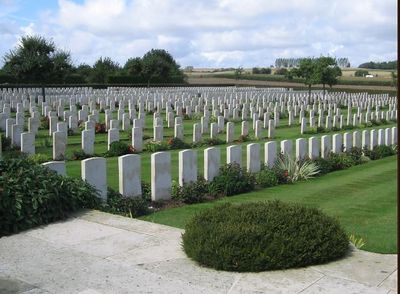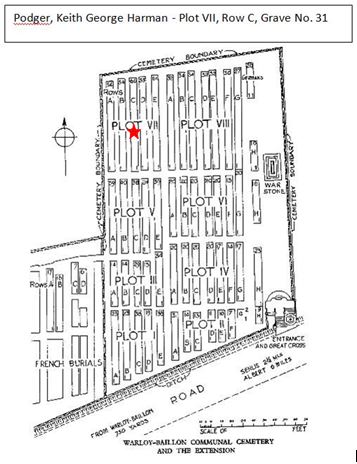Keith George Harman Podger
From Our Contribution
 | |
| Personal Information | |
|---|---|
| Date of Birth |
unknown "unknown" contains an extrinsic dash or other characters that are invalid for a date interpretation. |
| Place of Birth | Bunyip, Victoria |
| Death | 16 Aug 1916 |
| Place of Death | Mouquet Farm, Poziéres |
| Age at Enlistment | 19 years, 7 months |
| Description |
5' 7½" (1.71m) tall ; 140 lbs 63.503 kg ; fair complexion ; blue eyes ; light brown hair |
| Occupation | Sleeper hewer |
| Religion | Church of England |
| Address | Post Office Kelmscott, Western Australia |
| Next of Kin | Father , Mr George Podger |
| Military Information | |
| Reg Number | 3445 |
| Date of Enlistment | 9 Aug 1915 |
| Rank | Private |
| Unit/Formation | 11th Battalion, 11th Reinforcement transferred to A Company 51st Battalion / 13th Brigade, 4th Division |
| Date of Embarkation | 2 Nov 1915 ‒ 26 Nov 1915 |
| Ship Embarked On | HMAT A38 Ulysses |
| Fate |
Wounded in Action 14/16 Aug 1916 Mouquet Farm Died of his Wounds 16 Aug 1916 at 2/1South Midland Casualty Clearing Station |
| Monument |
Kelmscott War Memorial (South panel) Roleystone Honour Board Australian War Memorial |
| Medals |
1914-15 Star British War Medal Victory Medal |
Contents
Pre War
War Service
Six weeks after entering Blackboy Hill camp, Keith was allocated to the 11th reinforcement draft for the 11th Battalion.
On arrival in Egypt he joined the AIF Overseas Base in Ghezireh on 27 Nov 1915. Before joining the 11th Battalion on 2 Mar 1916 in Habieta he was hospitalised with diphtheria in the Suez Government Hospital for several days.
Within weeks of joining the battalion he was in hospital again, this time the 1st Australian Stationary Hospital in Ismailia with influenza from 30 Mar to 3 Apr 1916. Returning to his unit at Tel-el-Kebir on 9 Apr 1916, he was transferred to the 51st Battalion 10 days later as part of the reorganisation of the Australian forces.
Soon after, the 51st Battalion joined other troops moving to Alexandria to embark aboard the HMT Ivernia on 5 Sep 1916 for Marseilles, where they arrived at 7:00am on 11 Jun 1916, disembarking the following day. They then travelled north by train, commencing on 12 Jun 1916, and arriving at Caestre at 10:30pm on the 14 Jun 1916.
During the night of the 28/29th Jun 1916, A Company of the 51st Battalion moved into the front lines for the first time in the Petillon section, taking casualties almost immediately from enemy artillery bombardments. Relieved from the front line on the night of 10/11 July, they moved into billets in Estaires before moving over the next four days to Halloy where they begin training again, and rebuilt their numbers.
The battalion spent the first few days of August in Vadencourt before moving to Albert where preparations are undertaken prior to their role in the attack on Mouquet Farm. This occurred on the night of 14/15 Aug, with A Company on the right hand side of the attack. When contact with flanking units was lost, and the chances of holding captured trenches in daylight was thought to be slim, the battalion returned to their start point, minus some isolated parties that used shell holes as cover in no man's land. Soon after, they were on the receiving end of a very heavy bombardment, and again during the next day.
Keith may have received his wounds anytime between the initial attack and when the battalion was relieved on the night of the 16th. It was not recorded if he had been hit while holding a position in front of their trenches, or in their trenches, but he was carried from the field on the night of the 16th, and died late on the 16th in the 2/1st South Midland Casualty Clearing Station from shrapnel wounds to his loin and abdomen.
In his Red Cross file [1] there is a letter to a Miss Elsie Smith at the 1st Australian General Hospital who has enquired about the circumstances surrounding Keith's death. An informant has told them that he saw Podger in the dressing station at High Wood on 16 Aug 1916 with a shell wound to the spine.
Her relationship with Keith Podger is not revealed.
"Has gone into camp from Roleystone, and along with Alexander Main, Harris Smith and Frank Grabham was given a send off on Saturday, 13th September."[2]
"Keith George Harman Podger was 21 years of age when he enlisted on the 9th August 1915. On November 2 he sailed with the 11th reinforcements of the 11th, converted afterwards into the 51st in Egypt. He sailed to France in June and did service as a bomb thrower. He died of wounds on Aug 16. His father had enlisted several days before the news of his death came through."[3]
Notes
A letter on Keith's file from his mother Grace Podger in Kelmscott dated 10 November 1916 asks for help in cleaning up his affairs as she wants to leave WA as Keith was her "only son and there was nothing further to keep me here." It would appear that his father had died in the meantime.
A letter dated 10 Jan 1917 has Mrs Podger at "Aviemore", 15 Shadforth street, Mosman, Sydney, and she had been told by another soldier that her son was a mental case in the No 2 Wandsworth Hospital, London
- ↑ "Australian Red Cross Wounded and Missing Files - Keith George Harman Podger". Australian War Memorial. 2018. Retrieved 2 May 2018.
- ↑ The Drill of the Foot-Hills, 1915 Sep edition, p.8
- ↑ The Drill of the Foot-Hills, 1916 Oct-Nov edition,p.12

